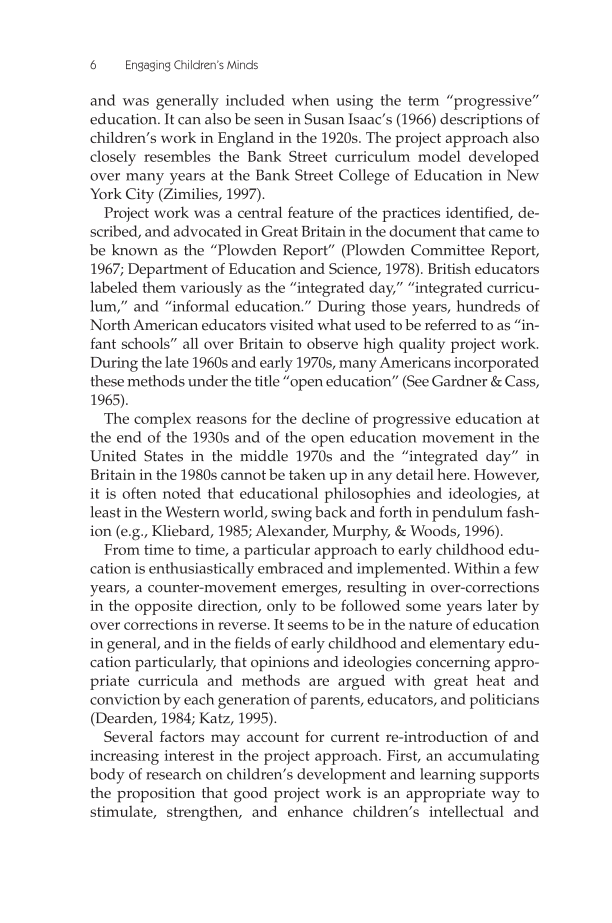6 Engaging Children’s Minds and was generally included when using the term “progressive” education. It can also be seen in Susan Isaac’s (1966) descriptions of children’s work in England in the 1920s. The project approach also closely resembles the Bank Street curriculum model developed over many years at the Bank Street College of Education in New York City (Zimilies, 1997). Project work was a central feature of the practices identified, de- scribed, and advocated in Great Britain in the document that came to be known as the “Plowden Report” (Plowden Committee Report, 1967 Department of Education and Science, 1978). British educators labeled them variously as the “integrated day,” “integrated curricu- lum,” and “informal education.” During those years, hundreds of North American educators visited what used to be referred to as “in- fant schools” all over Britain to observe high quality project work. During the late 1960s and early 1970s, many Americans incorporated these methods under the title “open education” (See Gardner & Cass, 1965). The complex reasons for the decline of progressive education at the end of the 1930s and of the open education movement in the United States in the middle 1970s and the “integrated day” in Britain in the 1980s cannot be taken up in any detail here. However, it is often noted that educational philosophies and ideologies, at least in the Western world, swing back and forth in pendulum fash- ion (e.g., Kliebard, 1985 Alexander, Murphy, & Woods, 1996). From time to time, a particular approach to early childhood edu- cation is enthusiastically embraced and implemented. Within a few years, a counter-movement emerges, resulting in over-corrections in the opposite direction, only to be followed some years later by over corrections in reverse. It seems to be in the nature of education in general, and in the fields of early childhood and elementary edu- cation particularly, that opinions and ideologies concerning appro- priate curricula and methods are argued with great heat and conviction by each generation of parents, educators, and politicians (Dearden, 1984 Katz, 1995). Several factors may account for current re-introduction of and increasing interest in the project approach. First, an accumulating body of research on children’s development and learning supports the proposition that good project work is an appropriate way to stimulate, strengthen, and enhance children’s intellectual and
Document Details My Account Print multiple pages
Print
You have printed 0 times in the last 24 hours.
Your print count will reset on at .
You may print 0 more time(s) before then.
You may print a maximum of 0 pages at a time.

































































































































































































































































